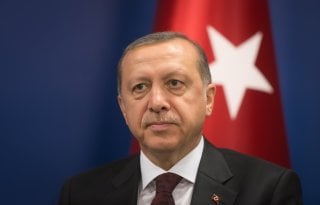Why Turkey and Egypt are Friendly Again
The rapprochement between Erdoǧan and Sisi could generate new momentum toward a more integrated region.
Last week’s Valentine’s Day agreement in Cairo between Turkish president Recep Tayyip Erdogan and Egyptian president Abdel Fattah el-Sisi should be considered a significant diplomatic achievement.
Following the Arab Spring, Hosni Mubarak—who had ruled Egypt for thirty years—was forced to step down in 2011 and was replaced by Muslim Brotherhood leader Mohammed Morsi the following year. In 2013, Morsi was toppled in a military coup led by General Sisi.
Three months earlier, King Abdullah of Jordan, in an interview with The Atlantic, envisioned a Muslim Brotherhood crescent developing in Egypt and Turkey to rival the Iranian-led Shia crescent. The king views Erdogan as a more restrained and savvy version of Morsi, who had set back the Muslim Brotherhood’s cause in Egypt by making a premature play for absolute power. “Instead of the Turkish model, taking six or seven years—being an Erdoǧan—Morsi wanted to do it overnight,” said Abdullah.
After the coup, Turkey provided a home for some twenty thousand Muslim Brotherhood members and their families. Erdogan called Sisi “an illegitimate tyrant” and said that Egypt could not be relied on to broker a peace treaty between Israel and Hamas in Gaza.
Erdogan also adopted the Brotherhood’s Rabia (four-finger) sign, which he said stood for “one nation, one state, one flag, one fatherland,” but decided to retire it when normalization talks began in May 2021.
However, Egypt—whose Zohr gas field is the largest in the Mediterranean—decided in January 2019 to form its own forum, the Eastern Mediterranean Gas Forum. It includes Israel, Cyprus, Greece, France, Italy, Jordan, and the Palestinian Authority, while the United States and European Union are observers. Turkey is excluded.
Egypt, which has two LNG export terminals, could be a regional energy hub but is hindered by domestic demand. Israel is a major source of pipeline gas, and by the end of 2021, Egypt also emerged as a key LNG supplier to Turkey.
The bottom line is that both Turkey and Egypt are in dire straits. Last August, Steven Cook, in a devastating critique, explained how Sisi had promised Egyptians prosperity but left Egypt flat broke. The same applies to Erdogan and Turkey.
In 2018, former governor of Turkey’s Central Bank, Durmus Yilmaz, blasted Erdogan’s handling of the economy, which for most of the 2000s was one of the world’s fastest-growing economies. Cheap credit went to government giveaways, crony contracts, pork barrel projects, and conspicuous consumption. Then, the global financial crisis struck.
Just two years ago, Erdogan told the Turkish Industry and Business Association (TÜSIAD) that as a Muslim, he would continue to lower interest rates in accordance with Islamic teaching and has fired three central bank governors for not reducing them.
However, after the May elections, Erdogan reinstated Mehmet Ali Simsek as finance minister, and in a return to economic orthodoxy, the basic lending rate has been incrementally increased from 8.5 percent to 45 percent.
Nevertheless, in January, Turkey’s official inflation rate was 64.86 percent, but according to an independent inflation research group, it was 129.11 percent.
On October 28, the eve of the centenary of the Turkish Republic, President Erdogan marked the occasion with a mass rally in Istanbul in support of the Palestinians.
When Erdogan and Sisi met in September on the sidelines of the G20 summit in New Delhi, cooperation in the energy field, for example, concerning LNG, was one of the issues discussed. In July, the exchange of ambassadors cleared the way for a renewal of bilateral ties.
Earlier this month, Turkish foreign minister Hakan Fidan said Turkey had agreed to provide Egypt with combat drones and technology. At the cordial meeting between the two leaders, there was not only an agreement on increasing trade but also a joint declaration on high-level strategic cooperation.
As witnessed by the recent meeting in Cairo between CIA head William Burns, the head of Egyptian intelligence, the Qatari prime minister Mohammed Al Thani, and an Israeli delegation, Egypt plays a central role in the search for a solution to the conflict in Gaza.
The strategic implications of the rapprochement between Turkey and Egypt are worth considering, particularly with regard to the equitable distribution of energy resources in the Levant Basin. Former U.S. ambassador Eric Edelman notes Erdogan definitely wants to win access to the Eastern Mediterranean Gas Forum and has concluded he can force his way in. However, this should not be necessary because, with Egypt as the prime mover, Turkey can be invited as an observer.
The trilateral partnership between Greece, Cyprus, and Israel has been undermined by the present conflict in Gaza, and the Athens Declaration on Friendly Relations and Good-Neighborliness—signed by Greece and Turkey in December— should obviate any Greek objections.
Cyprus is presently in limbo and like Greece, Turkey, and the United Kingdom, is awaiting the outcome of the report by the UN secretary-general’s new Cyprus envoy, which will determine whether there is a basis for a new UN-led peace initiative.
Consequently, as Barin Kayaoglu concludes in Al-Monitor, the thaw in relations between Turkey and Egypt could form a regional axis and generate new momentum toward a more integrated region.
Robert Ellis is a Turkey analyst and commentator. He is also an international advisor at the Research Institute for European and American Affairs in Athens.
Image: Shutterstock.com.

